广州版五年级下册英语笔记 unit1-3 M1笔记
小学英语五年级下册1-3单元知识点汇总
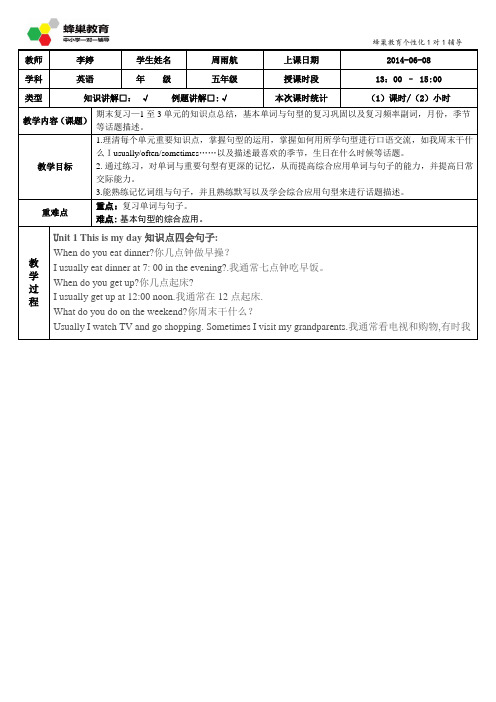
教师李婷学生姓名周雨航上课日期2014-06-08学科英语年级五年级授课时段13:00 – 15:00 类型知识讲解□:√例题讲解□:√本次课时统计(1)课时/(2)小时教学内容(课题)期末复习—1至3单元的知识点总结,基本单词与句型的复习巩固以及复习频率副词,月份,季节等话题描述。
教学目标1.理清每个单元重要知识点,掌握句型的运用,掌握如何用所学句型进行口语交流,如我周末干什么Iusually/often/sometimes……以及描述最喜欢的季节,生日在什么时候等话题。
2. 通过练习,对单词与重要句型有更深的记忆,从而提高综合应用单词与句子的能力,并提高日常交际能力。
3.能熟练记忆词组与句子,并且熟练默写以及学会综合应用句型来进行话题描述。
重难点重点:复习单词与句子。
难点:基本句型的综合应用。
教学过程U nit 1 This is my day知识点四会句子:When do you eat dinner?你几点钟做早操?I usually eat dinner at 7: 00 in the evening?.我通常七点钟吃早饭。
When do you get up?你几点起床?I usually get up at 12:00 noon.我通常在12点起床.What do you do on the weekend?你周末干什么?Usually I watch TV and go shopping. Sometimes I visit my grandparents.我通常看电视和购物,有时我还去看望祖父母.I often play football. Sometimes I go hiking.我经常踢足球,有时去远足四会单词及词组:do morning exercises 做早操eat breakfast吃早饭 get up起床have English class上英语课 play sports做运动eat dinner吃晚饭climb mountains爬山go shopping去购物 go hiking去远足visit grandparents看望祖父母play the piano弹钢琴when在……时候evening晚上 noon中午 weekend周末 usually通常 often经常sometimes有时Unit 2 what’s your favourite season?知识点四会句子:Which season do you like best?你最喜欢哪个季节?I like winter best.我最喜欢冬天。
五年级下册英语知识点归纳1~4单元
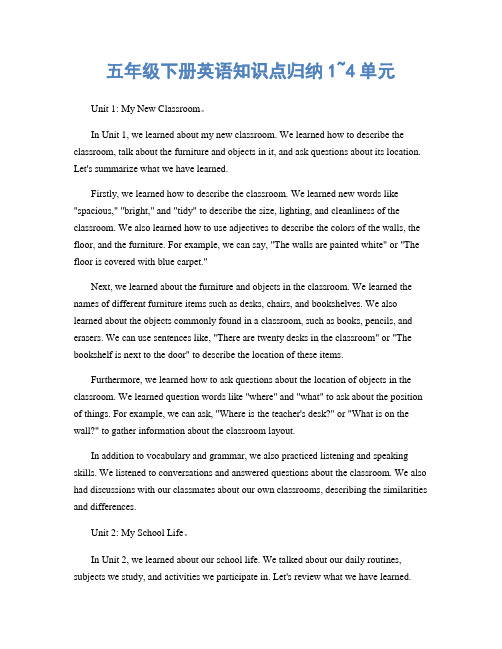
五年级下册英语知识点归纳1~4单元Unit 1: My New Classroom。
In Unit 1, we learned about my new classroom. We learned how to describe the classroom, talk about the furniture and objects in it, and ask questions about its location. Let's summarize what we have learned.Firstly, we learned how to describe the classroom. We learned new words like "spacious," "bright," and "tidy" to describe the size, lighting, and cleanliness of the classroom. We also learned how to use adjectives to describe the colors of the walls, the floor, and the furniture. For example, we can say, "The walls are painted white" or "The floor is covered with blue carpet."Next, we learned about the furniture and objects in the classroom. We learned the names of different furniture items such as desks, chairs, and bookshelves. We also learned about the objects commonly found in a classroom, such as books, pencils, and erasers. We can use sentences like, "There are twenty desks in the classroom" or "The bookshelf is next to the door" to describe the location of these items.Furthermore, we learned how to ask questions about the location of objects in the classroom. We learned question words like "where" and "what" to ask about the position of things. For example, we can ask, "Where is the teacher's desk?" or "What is on the wall?" to gather information about the classroom layout.In addition to vocabulary and grammar, we also practiced listening and speaking skills. We listened to conversations and answered questions about the classroom. We also had discussions with our classmates about our own classrooms, describing the similarities and differences.Unit 2: My School Life。
广州版五年级下册英语笔记 unit1-3 M1笔记
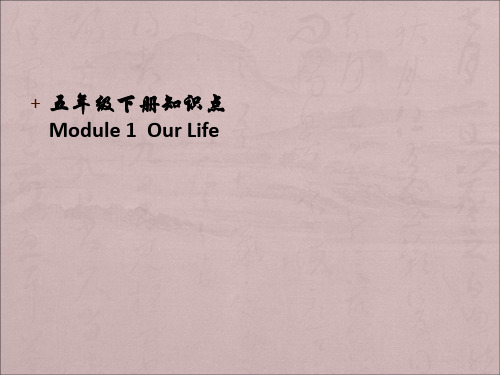
+ + + + +
+ + + + + + +
1、电话用语: May / Could / Can I speak to … This is … speaking. / Speaking. Who’s this / that? 2、He looks thinner now than before. 他现在看起来比 以前瘦很多。look看起来 3、be worried about … 担心 4、be late for school 上学迟到 5、hand in 交;递交 6、on time / in time 依时;按时 7、catch up with 赶上 8、比较:take (more) exercise have sports take morning exercises take eye exercises
+ + + + + + + + +
1) 一般情况加-s,例如: visit – visits tell – tells work – works wave – waves 2) 以s, x, sh, ch结尾的动词, 加-es,例如: wash – washes watch – watches catch – catches 3) 以辅音字母加y结尾的动词,改y为i加-es,例如: fly – flies study – studies 4) 部分以o结尾的动词加-es,例如: go – goes do – does 5) 特殊情况 have – has
五年级下册知识点moduleourlife1复习时态特别要掌握好一般现在时第三人称作主语的特殊疑问句
广州版五年级下册英语笔记M3笔记
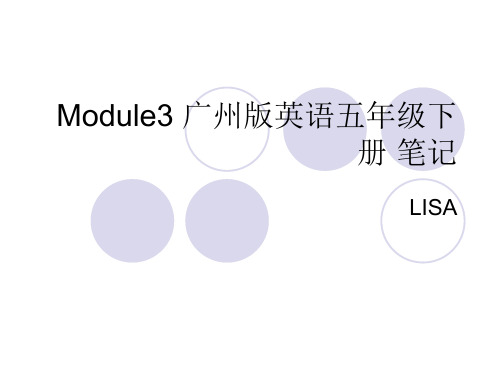
2、情态动词would及must、need的否定式 的用法及一些交际用语: 1) You needn’t go to school by bus. 2) We mustn’t pick the flowers. 3) Would you like to visit our new school? Yes, I’d love to. 4) Welcome to our school. Thank et still 用于肯定句和疑问句: He still works at Guangming Farm. Does she still study at that primary school? yet 用于否定句: They don’t start to work yet.
翻译句子:
1、谁比Jim年纪大?是你。 ________ is _________than Jim? ________ are 2、谁比David更强壮?是Gao Shan. ________ _________ than David? Gao Shan ________. 3、谁的铅笔更长,他的还是她的?我想是她的。 _________ pencil is _________,______or________? ________is,I think. 4、谁的苹果更重,你的姐姐的还是你的弟弟的? 我的 弟弟的。 ______ apples ______ ________,your _______ or your _______? My ______ _______. 5、你和你的叔叔一样高吗?是的。 _________ ________as _________as your uncle? Yes, I am.
Unit 9 far 的比较级1)farther(更远)具体的.一 般表示距离 2)further(进一步)抽象事 物 一般表示学业深造 最高级 farthest/furthest
五年级英语下册Unit1—Unit3 知识点

☺五年级下册Unit1—Unit3 知识点☺1、表示“频率”:usually,usually 通常;often,often 经常;sometimes,sometimes 有时候;always,always 总是;never,never 绝不2、表示“也”:too在肯句尾,either否句尾,also放句中。
如:①I going hiking,_____.②I can’t go shopping,_________.3、Thank you for + 动词ing,如:Thank you for _______ (tell)me.谢谢你告诉我。
4、leaf(_______)的复数很特别,改___ → ___ + ___ = __________。
5、第三人称单数很孤单,动词后面加s,否定形式用doesn’t。
如:①Winter __________.(come)②My father _________(not)like summer.6、A. 序数词的行程规则:①一般情况下,序数词=基数词+th。
如:four → __________②以ve结尾:改ve→f+th。
如:five → __________twelve→_______以y 结尾:改y→ie+th。
如:twenty → __________thirty → _______③特殊情况是:one→ ______ ,two→ ______ three→ ______B. 序数词的简写规则:将末尾的2字母写在数字的右上角。
7、问答:①When do you play sports? I usually play sports at 4:00.②What’s y our favourite season? My __________ _______ ___ _________.③Which season do you like best? I like _______________ _____________.④When is your birthday? My birthday is _____8. 变一般疑问句和否定句及对划线部分提问专题训练:-wh特殊疑问词:when when 问时间,where where 在哪里what what 是什么why why为什么because because 是因为,which which 哪一个whose whose 是谁的。
广州版五年级英语下册1-12单元重点内容详解(复习资料)

辅导资料(广州版英语五年级下册)目录Unit 1 What’s your favourite season? (1)Unit 2 It’s the middle of winter (7)Unit 3 We are going to have an English test (12)Unit 4 Have a good time in Hainan (18)Unit 5 Would you like to go with us ? (28)Unit 6 See you at the party (33)Unit 7 We will go by train (38)Unit 8 Ben’s first trip to Beijing (46)Unit 9 Be careful (51)Unit 10 How to stay safe (56)Unit 11 Can you tell me the way? (61)Unit 12 I know a short cut (66)Unit 1 What’s your favourite season?一、重点短语:look at ... 看……the best time for... 最佳时机make a snowman 堆雪人fly a kite 放风筝go skiing 去滑雪go camping 去野营plant flowers 种花play outdoors 户外玩耍二、重点句型:1. --What’s your favourite season?--My favourite season is summer.2. --Which season do you like best?--I like spring best.3. --Do you like summer?-- Yes , I do./No, I don't.三、重点分析:【知识考点一】in the tree 和 on the tree的区别;相同之处:都可以表示在树上不同之处:in the tree表示在树上的东西,是外来的,比如人,鸟;on the tree表示在树上的东西,本是树的一部分,比如果实,花朵,叶子。
最新广州版英语五年级下册知识点汇总
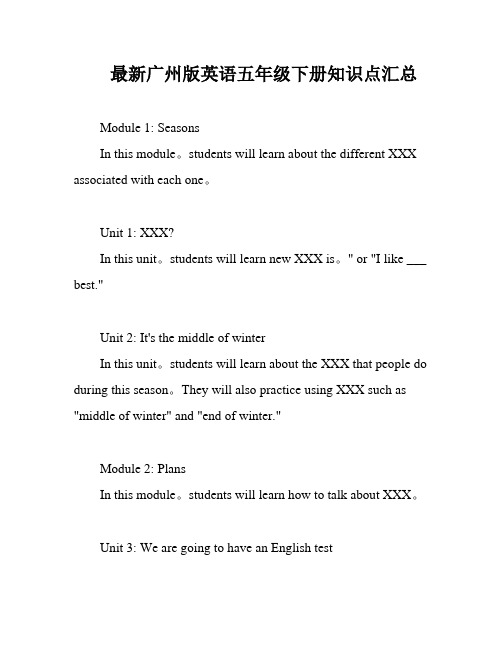
最新广州版英语五年级下册知识点汇总Module 1: SeasonsIn this module。
students will learn about the different XXX associated with each one。
Unit 1: XXX?In this unit。
students will learn new XXX is。
" or "I like ___ best."Unit 2: It's the middle of winterIn this unit。
students will learn about the XXX that people do during this season。
They will also practice using XXX such as "middle of winter" and "end of winter."Module 2: PlansIn this module。
students will learn how to talk about XXX。
Unit 3: We are going to have an English testIn this unit。
students will learn how to express future plans using the phrase "going to." They will also XXX。
Unit 4: Have a good time in HainanIn this unit。
students will learn about the tropical island of Hainan and the activities that people do there。
They will also practice using the XXX ing trips and events。
广州版小学英语五年级下每单元知识点

12.
have lunch
吃午饭
13.
help each other
互相帮助
14.
help sb. with sth.
帮某人做某事
15.
like you
像你一样
16.
need to dosth.
需要做某事
17.
other subjects
别的科目
18.
pen friend
笔友
19.
play the piano
大量的蔬菜
5.
at school
在学校
6.
feel hungry/ tired/ hot/ cold
觉得饿/累/冷/热
7.
for a long time
很长时间
8.
givesb.a check-up
给某人进行一次体检
9.
go to bed early
早睡
10.
hand in one’s homework
你们的新学校有更多的教师吗?
Yes,it does.
是的。
8.
Doesit have more classrooms in your new school?
你们的新学校有更多的教室吗?
No,it doesn’t.
不,没有。
9.
How manystudentsare therein your school?
一、单词
★better
更好的
★bright
光亮的
★hers
她的
★his
他的
★large
大的
★more
更多
★more than
- 1、下载文档前请自行甄别文档内容的完整性,平台不提供额外的编辑、内容补充、找答案等附加服务。
- 2、"仅部分预览"的文档,不可在线预览部分如存在完整性等问题,可反馈申请退款(可完整预览的文档不适用该条件!)。
- 3、如文档侵犯您的权益,请联系客服反馈,我们会尽快为您处理(人工客服工作时间:9:00-18:30)。
Module 1 Our Life
+ 一、 1)能就“自己的日常生活”的话题进行交 + + + + + + + + +
谈; 2)能就“比较”的话题进行交谈; 3)能用电话用语进行交流。 1、复习时态,特别要掌握好一般现在时第三人称 作主语的特殊疑问句: 1) How does he/she go to school? 2) What time does he/she get up? 3) Where does he/she study? 4) Whose former pupil lives in Leeds? 5) Which school does she study at? 6) Who studies at Rose School?
ቤተ መጻሕፍቲ ባይዱ
+ 2、总结主语是第三人称单数时, 一般现在时的特 + + + + + + + + + + + +
殊疑问句形式, 如: What time does he get up? He gets up at six. Where does she live? She lives in Renmin Road. How does he go to work? He goes to work by bus. Who hands in the homework? Jiamin does. Whose friend practices the piano? Jane’s friend. Which school does she study at ? She studies at No. 2 School?
+ + + + + + + + +
1) 一般情况加-s,例如: visit – visits tell – tells work – works wave – waves 2) 以s, x, sh, ch结尾的动词, 加-es,例如: wash – washes watch – watches catch – catches 3) 以辅音字母加y结尾的动词,改y为i加-es,例如: fly – flies study – studies 4) 部分以o结尾的动词加-es,例如: go – goes do – does 5) 特殊情况 have – has
+ Unit 3 + 1、区别sleep / sleepy / asleep + sleep v. 睡觉 He is sleeping on his mother’s
bed. 他睡在他妈妈的床上。 + sleepy adj. 困的 I’m sleepy. I want to go to bed. 我很困,我想睡觉。 + asleep adj. 睡熟了 He is fast asleep. 他很快 睡觉。
• • • • • • • • • •
2、初步体验形容词比较级的句型: 1) He is/looks thinner now than before. 2) Is he taller than me? 3) Does he look taller than me? 4) He isn’t stronger than me. 3、情态动词should、could、may的用法及一些 交际用语: 1) He should get up early. 2) She shouldn’t play computer game too much. 3) Could you help me? I’d be glad/love to. 4) May I sit speak to Jane
+ 4、电话用语:
+ -- May I speak to Mr Li? + -- This is Ben speaking
+ 1、总结主语是第三人称单数时, 一般现在
时的肯定句,否定句和一般疑问句的变化, 例 如: + I eat dinner at six. He eats dinner at six too. + I don’t eat dinner at six. He doesn’t eat dinner at six either. + Do you eat dinner at six? Does he eat dinner at six?
+ + + + +
+ + + + + + +
1、电话用语: May / Could / Can I speak to … This is … speaking. / Speaking. Who’s this / that? 2、He looks thinner now than before. 他现在看起来比 以前瘦很多。look看起来 3、be worried about … 担心 4、be late for school 上学迟到 5、hand in 交;递交 6、on time / in time 依时;按时 7、catch up with 赶上 8、比较:take (more) exercise have sports take morning exercises take eye exercises
+ 2、ten more minutes 十来分钟
+ 3、Did You Know: 1. Don’t be late for party.
参加聚会不要迟到。 + 4. Don’t ask adults about ages. 不要问成年人 关于他们的年龄。 + 5. Don’t talk to others when there’s too much food in your mouth. 在满嘴是食物时不要跟 别人说话。
+ + + + + + + + + + + +
Unit 1 1、for an hour for 表示时间的长度,例如:for two years half an hour 半小时 an hour and a half 一个半小时 2、注意句型: Could you …? I’d be glad to. / I’d love to. 3、比较级句型: She is older than me. She is one year older than me. 4、keep the rule 守规律;守规则
